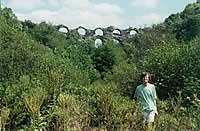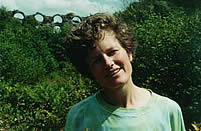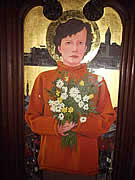More about Alice
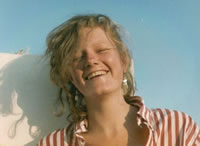 Alice did not want to be remembered as someone who died of cancer: she wanted
to be remembered for how she lived, not how she died. So this page is to
tell you a little about Alice’s life, and the things that drove her.
Alice had a passionate interest in natural history and the environment.
Whether it was enjoying a wildflower meadow in Scotland, or studying the
green turtle, these were the things that inspired her. Although
natural history was her over-riding interest, whatever Alice did, she did
with great energy and with her whole heart.
Alice did not want to be remembered as someone who died of cancer: she wanted
to be remembered for how she lived, not how she died. So this page is to
tell you a little about Alice’s life, and the things that drove her.
Alice had a passionate interest in natural history and the environment.
Whether it was enjoying a wildflower meadow in Scotland, or studying the
green turtle, these were the things that inspired her. Although
natural history was her over-riding interest, whatever Alice did, she did
with great energy and with her whole heart.
She obtained a geography degree from St Andrew’s University, Scotland and then set off to Istanbul where she taught English at Bosphorus University. Alice fell in love with Turkey and Istanbul and spent 10 very happy years there, becoming fluent in Turkish. She also worked for an environmental organisation called DHKD, and while with them carried out research on green turtles, as well as campaigning against performing circus bears.
She contributed to a magazine called Cornucopia, in which she wrote, among other subjects, about the cats in Istanbul. Her love of practical gardening led her to get involved in a garden design business. Alice made friends wherever she went and is remembered in many different ways by many different people. Friends from Istanbul have planted a tree in her memory in the Remembrance Garden at Bosphorus University. At Christ Church, Istanbul her portrait, as St Hilda of Whitby, forms part of the north chancel screen.
If you should get a chance to visit this church have a close look at the background details, which tell a lot about Alice’s life.
 Alice’s enthusiasm for the natural world started well before her arrival
in Turkey. She was born in England in 1966 and was only two years old when
her parents went to work in Uganda, East Africa. What was supposed
to be a two-year posting lasted nearly 20 years and so Alice spent most of
her formative years in Uganda.She was
at kindergarten and primary school in Kampala before she started boarding
at a prep school in rural Kenya, followed by St Swithun’s, Winchester.
Alice’s early childhood contributed to her independent spirit and maturity,
as well as nurturing her interest in natural history.
Alice’s enthusiasm for the natural world started well before her arrival
in Turkey. She was born in England in 1966 and was only two years old when
her parents went to work in Uganda, East Africa. What was supposed
to be a two-year posting lasted nearly 20 years and so Alice spent most of
her formative years in Uganda.She was
at kindergarten and primary school in Kampala before she started boarding
at a prep school in rural Kenya, followed by St Swithun’s, Winchester.
Alice’s early childhood contributed to her independent spirit and maturity,
as well as nurturing her interest in natural history.
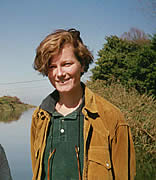 As part of her Biology A-level she undertook a project during one summer
holiday on ‘The ecology of a palm tree’. This enthused her, and
she spent many hours either up a ladder examining the top of the palm tree,
or on her hands and knees at the bottom of it. She also took every opportunity
to visit the game parks in Uganda. In particular she spent time in Kibale
Forest, in the west of Uganda, living with some biologists who were studying
the Colobus monkey.
As part of her Biology A-level she undertook a project during one summer
holiday on ‘The ecology of a palm tree’. This enthused her, and
she spent many hours either up a ladder examining the top of the palm tree,
or on her hands and knees at the bottom of it. She also took every opportunity
to visit the game parks in Uganda. In particular she spent time in Kibale
Forest, in the west of Uganda, living with some biologists who were studying
the Colobus monkey.
During her gap year, Alice was lucky enough to be invited to join an expedition to Aldabra, an isolated atoll in the Indian Ocean with a population of giant tortoises, its own flightless bird, and a varied and unique flora and fauna. She was one of about 20 students (and the only woman), and they lived there with few creature comforts but for Alice it was an experience never to be forgotten. Alice is remembered by another member of the expedition as taking the difficult conditions in her stride in her quiet but very determined and confident way. Aldabra made a huge impression on her, and in some ways it was a turning point in her life. Later that same year she travelled round India with a school friend, returning with stories of being stranded on a mountainside on the road to Kashmir following a landslide, joining a pilgrimage, and being stung by a scorpion in the middle of nowhere. In spite of this, her love of adventure continued.
Alice’s great strength of character and bravery became apparent when she was diagnosed with malignant melanoma. She made the decision to leave Turkey to receive treatment in the UK. With remarkable courage she resumed her life in the UK, carrying on as near to normal as she was able. She never complained or wallowed in self-pity. She later moved up to Scotland, where she worked as long as she could, raising funds for the Royal Scottish National Orchestra, and living in rural Scotland. This was where Alice spent her final happy years before she died in 2001.
We have established this Trust in order to perpetuate Alice’s name and encourage other talented, energetic youngsters to pursue the things that Alice loved during her short life.

